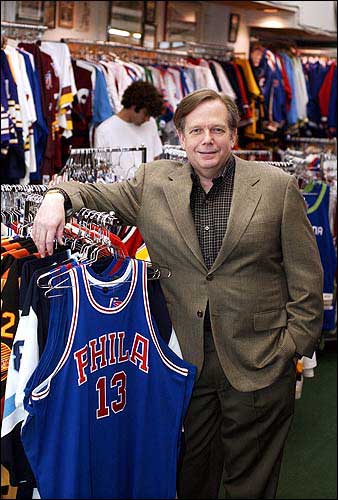In cutting-edge fashion world, Philly company goes old-school
Philadelphia ? Peter Capolino spins wool and memories together to bring the history of sports to a whole new generation.
Capolino owns Mitchell & Ness Nostalgia Co., a clothing company now at the forefront of urban fashion, producing authentic replica “throwback” jerseys for all four major professional sports, which are among the most sought-after fashion pieces for young people. Costing anywhere from $150 to $500, it’s the brand of choice for rap stars, athletes and other residents of the fashionable elite.
That success is the result of an unlikely partnership.
Capolino, 58, is not the kind of man you’d expect to head a company which relies almost entirely on rap artists to showcase his wares.
A bespectacled, graying man who prefers John Denver to Ja Rule, Capolino began producing retro jerseys in 1985 after finding 12,000 yards of wool flannel, the material baseball jerseys were made from before the 1970s, in a local warehouse. He envisioned a line of jerseys bearing the names of past heroes that catered to middle-aged white men looking to reconnect to their youth. They sold well, but Mitchell & Ness didn’t take off until “Big Rube,” a 6-foot-2, 325-pound black man from West Philadelphia, offered his services to Capolino.
“He told me I didn’t know what I had,” Capolino says.
Rueben Harley had been shopping at Mitchell & Ness for Negro League baseball caps and retro jerseys for a decade before he came to Capolino with an idea to market the jerseys in April 2001. Atlanta rap duo OutKast had just worn throwback jerseys in videos and liner notes for their album “Aquamini.” Harley thought there would be a market for Capolino’s jerseys in the hip-hop world.
“He told me, ‘I’m going to make you rich,”‘ says Capolino. “I told him, ‘You’re crazy.”‘
Ahead of the curve

Peter Capolino, owner of Mitchell & Ness clothing store in Philadelphia, stands among some of the replica throwback jerseys the store sells. The jerseys are among the most sought-after fashion pieces for young people, costing anywhere from 50 to 00.
Harley took jerseys to New York, crashing parties and visiting record companies with the shirts in hand.
“It was just a lot of grass-roots marketing,” he says humbly.
Harley says the big break for Mitchell and Ness came in January 2002, when Sean “P. Diddy” Combs hosted the American Music Awards.
Combs wore a throwback Philadelphia Phillies jacket and a Hank Aaron jersey, along with much of the rest of the Mitchell & Ness line.
“He kept changing at every commercial,” Harley says.
Mitchell & Ness had arrived.
Athletes soon followed suit, with notables such as Allen Iverson, Shaquille O’Neal and Kobe Bryant sporting the throwbacks.
Iverson proved to be ahead of the curve, having appeared on the March 1999 edition of Slam magazine in a 1966-67 road 76ers jersey and a substantial afro.
O’Neal’s first throwback purchase was a reproduction of Iverson’s 1996-97 rookie jersey. Bryant also owns a Sixers jersey, that of his father, Joe “Jellybean” Bryant.
The popularity of the jerseys among star athletes was never more apparent than when high school hoops phenom LeBron James accepted two jerseys from a Cleveland clothing store. They nearly cost James his senior season by jeopardizing his amateur status for profiting from his athletic fame.
Booming business
Mitchell & Ness products now appear in more than 700 locations across the country. Many of the cities with professional sports teams have more than one retailer.
Business is booming. Sales are up from a modest $2.2 million in 1999 to more than $25 million in 2002. Capolino says there’s no reason to expect sales to slow down any time soon.
“We’re projecting over $40 million in sales in 2003,” he says.
Brenda Lloyd, activewear market editor for DNR Magazine, an industry publication that monitors men’s fashion, says the retro craze is strong now, but an ever-increasing supply of a hot item can slow a trend. She notes that large suppliers of athletic wear like Nike and Reebok are getting into the market. Their impact on the trend is an unknown.
“It could go either way,” she says. “If you have everybody jumping in on it, it could flood the market and drive the prices down.”
On the other hand, she notes that a company producing small lots of popular items, like Mitchell & Ness, stands a good chance of staying strong for a long time.
“They’ve been such a star in this business,” she says. “They’ll still be the place to go because of their good reputation.”
Mitchell & Ness may be immune from Nike and Reebok coming to the market, since it’s the only company licensed by all four major leagues to produce authentic retro jerseys that can combine all the elements: player names and numbers and the fabrics those players wore. That makes the company’s biggest competitive problem cheap knockoff copies of its product.
Capolino and Harley agree that it’s both a curse and a blessing.
“It’s a double-edged sword,” Harley says. “When you get knocked off, you know you’re doing something good.”
Capolino says it’s good to be counted among fashion’s elite.
“Rolex, Gucci, Versace and Mitchell & Ness,” he says. “Those are the names.”






